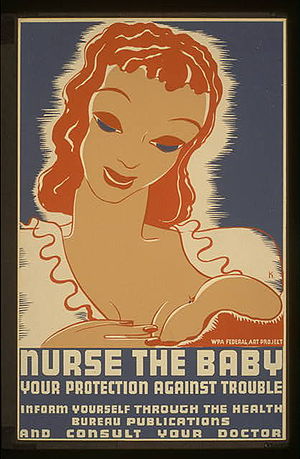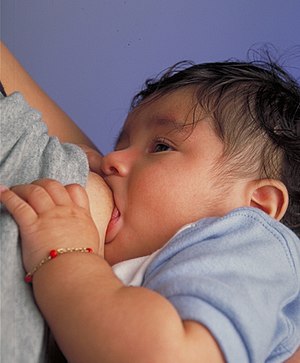Because It’s About More than Nutrition
Welcome to the Breastfeeding Support Blog Party! Bloggers around the world have gathered together to share posts which provide current or soon-to-be breastfeeding mothers with a wealth of well-researched information, personal stories, and statistics designed to help you have the most successful breastfeeding experience possible. Be sure to scroll to the bottom of this post to learn more about this movement as well as to link to and read more informative breastfeeding support posts.
*******
I could tell you that breastmilk is best, but you know that already. And I could point you to lots and lots of information to support that. But I think what you really need to hear is something different, something more. What I really want to tell you is that breastmilk — no, not just breastmilk, but the very act of breastfeeding itself — is normal. I mean to say it is the biological norm for all mammals and, as you are no doubt aware, we are mammals. “Human milk is species-specific, and all substitute feeding preparations differ markedly from it, making human milk uniquely superior for infant feeding.”1
Still, what is the biological norm isn’t always feasible. I get that. I know that so very much goes into the decision of what to feed your baby. It’s complicated. It’s complex and it isn’t always cut and dry. I have friends who breastfeed, yes, but I also have friends who use their pumped breastmilk, or donor milk, or over-the-counter infant formula, or homemade formula. Guess what they all have in common? They are fantastic mothers who love their babies intensely and want the absolute best for them. I love watching them with their babies and can see the love absolutely pouring out of them. There is no doubt that they give their children the best they have to offer.

So what am I getting at? What am I really trying to say here? I want to make a case for breastmilk and the act of breastfeeding because there are so many people and corporations trying to tell you that, well yes breastmilk is best but really the alternatives are pretty close. They are persistent and persuasive and have the money to make an impact. Breastmilk doesn’t make anyone any money. And breastfeeding is under attack. Some may try to convince you that you must eat perfectly or forget breastfeeding. Some will convince you that breastmilk is too full of toxins to be safe. (The formula companies did this very successfully in the 1950’s using doctors as their mouthpieces.) There are breastfeeding booby traps: the system is failing women every day. So I want to speak up. I want to tell you maybe what you aren’t hearing. I know you are hearing “breast is best.” I want to tell you breastfeeding is normal. And it’s amazing, but not just because it is the best food for your baby.
Are you still with me? Because, after that lengthy preamble, I’m ready to get down to what I really want you to know. This is the good stuff. This is what you and your baby are getting above and beyond the superior nutrition of breastmilk when you breastfeed. These are just some of the extras that the act of breastfeeding provides.
- Immunity – Say your baby is away from you. Maybe you took him to a friend’s so you could go get your hair cut or maybe you work and your baby is in daycare during the day. Say your friend (or daycare provider) has a cold, or worse, the flu but isn’t showing symptoms yet. But they are contagious. Now your baby has been exposed. But, don’t worry just yet because something really cool is about to happen when you bring your baby to nurse.
“When a mother kisses her baby, she ‘samples’ those pathogens that are on the baby’s face. Those are ones that the baby is about to ingest. These samples are taken up by the mother’s secondary lymphoid organs like the tonsils, and memory B cells specific for those pathogens are re-stimulated. These B cells then migrate to the mother’s breasts where they produce just those antibodies that the baby needs.”2
In addition, “…a baby’s saliva actually communicates with the mother and literally affects the composition of the milk based on the baby’s unique needs!”3
- Maternal Health – Mama, you get to benefit, too! Breastfeeding not only helps in the short term by giving you oxytocin at a time when you really, really need it to bring your uterus back down to it’s pre-pregnant size (which will help your body return to it’s normal state more quickly) and to prevent hemorrhage, but it has many fantastic long term benefits as well. I’ll just name a few: reduced risk of various cancers (ovarian cancer, breast cancer, etc), calmer mental state (less intense response to adrenaline thanks to the hormone, prolactin, released when nursing), reduced fracture risk later in life, lower risk of heart problems, etc.4
- Bonding – “Researchers have pointed out that the bond of a nursing mother and child is stronger than any other human contact. Holding the child to her breast provides most mothers with a more powerful psychological experience than carrying the fetus inside her uterus. The relationship between mother and child is rooted in the interactions of breastfeeding. This feeling sets the health and psychological foundation for years to come.”5
- Gut Health – Have you heard of the virgin gut? I’ll give you the short version of the definition. It means that the baby’s gut remains sterile because nothing but breastmilk has been given to the baby. Suffice it to say, it’s the ideal and it protects the baby from sickness and from pathogens entering the baby’s bloodstream. “Supplementing breastmilk with even just a little bit of formula can affect the acidity of the gut environment, possibly promoting the presence of harmful bacteria and threatening the integrity of the gut lining.”6
- Moral Development – Can breastfeeding your child really impact their behavior for the better? Research shows a correlation between children’s positive interactions and breastfeeding, so yes, it is very possible! “…breastfeeding initiation is correlated with social cooperation at 18 months, fewer behavior problems at 24 months, and empathy at age three. Breastfeeding length is correlated in 3 year olds with inhibitory control (being able to stop one’s behavior), sense of guilt, and concern after doing something wrong.”7
I hope I’ve given you some food for thought (pun intended ;)). “Breastmilk changes composition throughout each day, from feeding to feeding, from mother to mother, to adapt to the needs of the child.8 No formula will ever be able to accomplish that, no matter how nutritionally sound it may be.
*******
This gathering of breastfeeding support comes in response to the Weston A. Price Foundation’s (WAPF) continued stance on breastfeeding, which we all have a great concern with. While the WAPF does support breastfeeding as the best option for feeding babies, it does so with a caveat. Breastfeeding mothers must follow the strict tenants of the WAPF diet and mothers who are not following their nutrient dense diet recommendations would be better off feeding their babies homemade formula (based on the WAPF recipe). In addition, they are outspoken against using donor milk.
The bloggers sharing posts today are concerned with the confusion this may cause breastfeeding mothers. Not only does research support the myriad of health benefits of breast milk for babies regardless of the mother’s diet, it also outlines additional benefits of breastfeeding such as better bonding, deeper trust, and a long list of other emotional benefits. Let’s not forget the health benefits for moms!
We will have a complete list of all the blog posts published today (as part of this Blog Party) in a separate post on Sunday, March 31st. We welcome you to join this blog party by linking up your own new and previously published posts which focus on any positive aspect of breastfeeding and breast milk. Please enter using the Linky Tool which can be found at Hybrid Rasta Mama, Cooking Traditional Foods, Whole New Mom, Alternative Parenting, or African Babies Don’t Cry. (All links will be subject to moderation. Any link not following the spirit of the Blog Party will be removed.)
- Hambraeus L, Forsum E, Lönnerdal B. Nutritional aspects of breast milk and cow’s milk formulas. In: Hambraeus L, Hanson L, MacFarlane H, eds. Symposium on Food and Immunology. Stockholm, Sweden: Almqvist and Wiksell; 1975 ↩
- Lauren Sompayrac, author of “How The Immune System Works”. Quote from “Why Mother’s Kiss Their Babies“ ↩
- Dr. Alexander Rinehart, MS, DC, CCN “The Important Role of Breastfeeding on Infant Gut Development“ ↩
- Alicia Dermer, MD, IBCLC, “A Well-Kept Secret: Breastfeeding’s Benefits to Mothers“ ↩
- Natural Resources Defense Council, “Healthy Milk, Healthy Baby“ ↩
- Bullen CL, Tearle PV, Stewart MG. The effect of humanized milks and supplemented breast feeding on the faecal flora of infants. J Med Microbiol 1977; 10:403-413; Mackie RI, Sghir A, Gaskins HR. Developmental microbial ecology of the neonatal gastrointestinal tract. Am J Clin Nutr 1999; 69(Suppl):1035S-1045S. Quoted from “The Important Role of Breastfeeding on Infant Gut Development“ ↩
- Dr. Darcia Narvaez, Ph.D., “Science You Can Use: Does breastfeeding influence your kids’ moral development? ↩
- Hibberd, C., Brooke, O., Carter, N, Haug, M., & Harzer, G. (1982). Variation in the composition of breastmilk during the first 5 weeks of lactation: implications for the feeding of preterm infants. Arch Dis Child, 57, 658-62. Quoted from “The Tremendous Benefits of Doing What is Normal: Breastfeeding“ ↩







